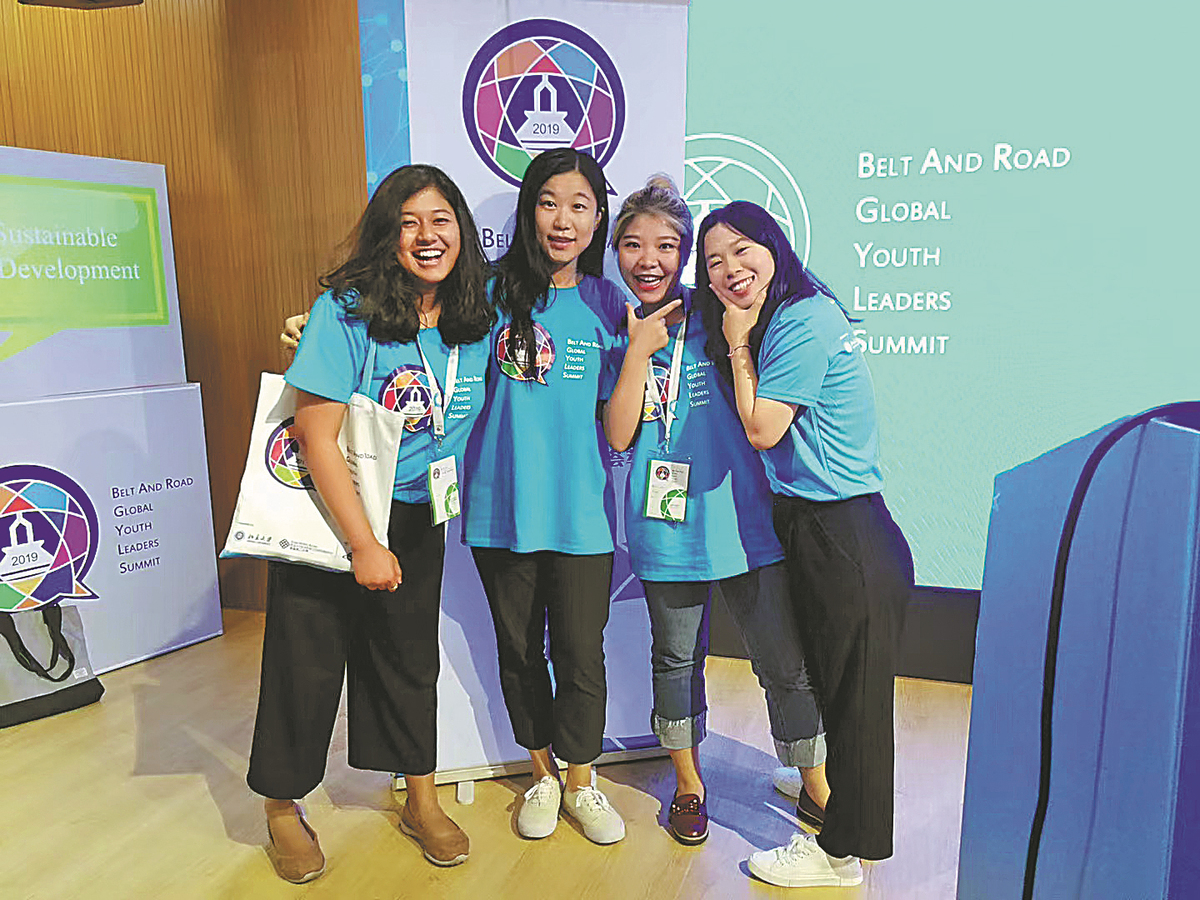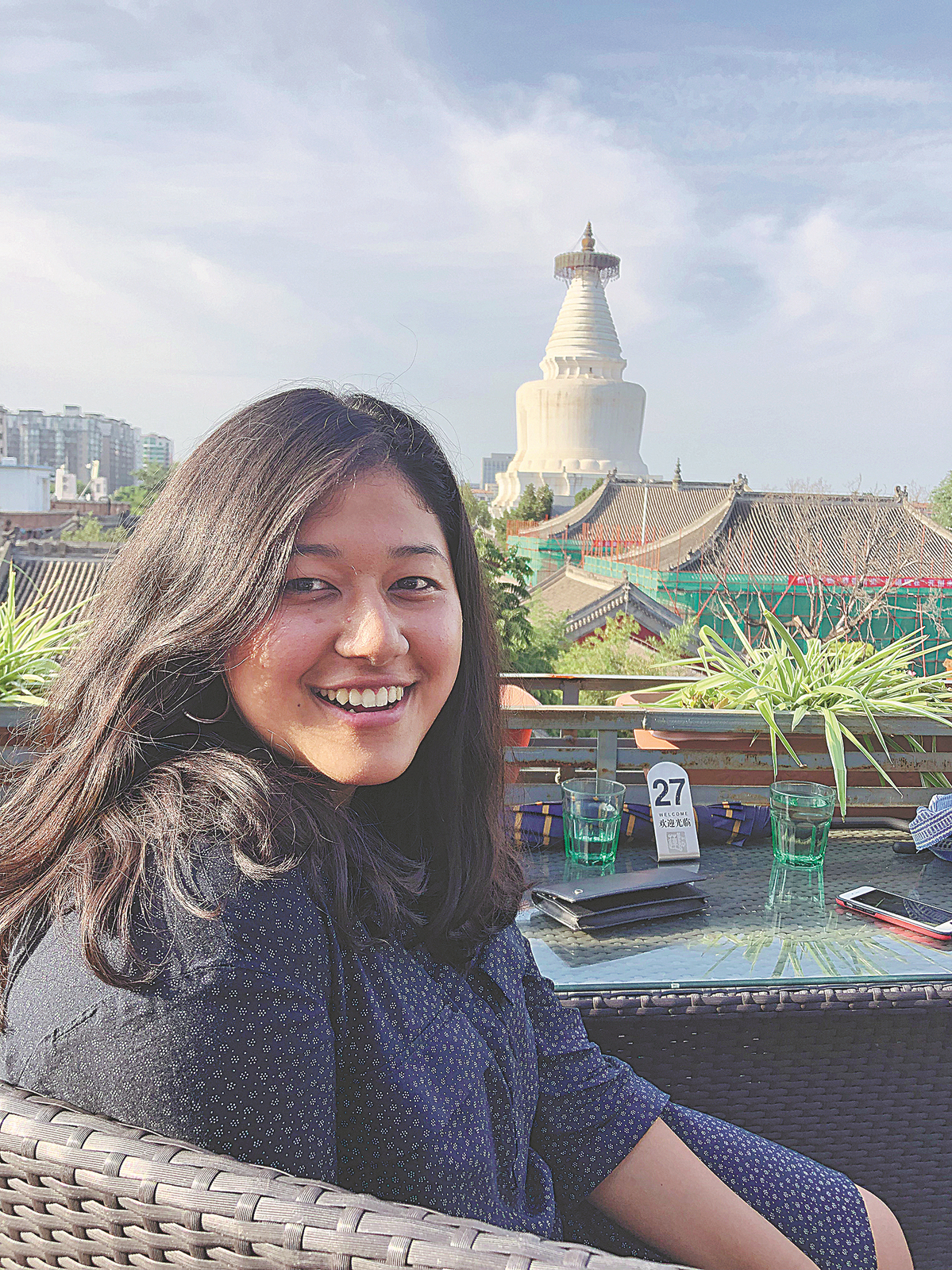Peking University, May 21, 2022: Political science major, living in Beijing, says she learned about the country in and out of the classroom
Aneka Rebecca Rajbhandari (left) poses with three other participants at the Belt and Road Global Youth Leaders Summit 2019 in Beijing. [Photo/China Daily]
As the first Nepali student in Peking University's undergraduate program, things were definitely intimidating for Aneka Rebecca Rajbhandari at the beginning.
Having chosen the road not taken, or at least the road least taken, meant that she had to learn everything by herself, without guidance from seniors from home who could recommend classes, study methods or share class notes.
Nonetheless, Rajbhandari, who graduated from the university's School of Government last year with a degree in political science, said she is grateful for the experience, which has made her more independent and resilient.
She first came to Beijing in 2015 with no command of the language. As a requirement of the Chinese Government Scholarship for students unable to speak Chinese, she started out studying Chinese in the Beijing Language and Culture University's pre-university program.
She is now doing her masters in Chinese politics at the Silk Road School of the Renmin University of China.
It was not until Rajbhandari's father visited China several times in the late 1990s through his work with the United Nations that she was motivated to pursue her interest in political science here.
"When I decided to apply to China, a lot of high school classmates were skeptical. It is understandable that they had such a reaction because Western universities, especially in the United States, are generally more popular choices in Nepal," she said.
Still, she was keen on understanding Chinese foreign policy and on learning to speak Chinese.
Now, she can communicate in English, Nepali, Hindi and Mandarin proficiently and said that being able to speak these languages also means "she can now converse with half the world's population".
Interestingly, Rajbhandari's first encounters with China began at age 12, when she was raising money for the victims of the 2008 Wenquan earthquake.
Although she was aware of the massive development China has undergone over the years from her father and the news, she understood the importance of witnessing it firsthand only when she arrived.
She learned that China was about more than the development of its cities and infrastructure, and what intrigued her more were intangible aspects, such as its culture and values.
She said she was particularly impressed by people's drive and determination to learn.
Rajbhandari noticed that people here are usually curious and always interested in learning new things.
"I still remember befriending a security guard when I was learning Chinese. He wanted to practice his English and I wanted to practice Chinese. Although I had a difficult time understanding him due to his thick accent, I was pleasantly surprised by how different Chinese can sound in different cities."
While the international relations course was a lot more popular among international students, Rajbhandari believes that in order to be able to understand international politics, one has to begin with understanding China's domestic politics.
She said that people generally have a skeptical view of studying politics in China and a fear of bias, often as a result of influence by Western media.
Rajbhandari disagrees with the perception. Instead, she believes that this is exactly why studying China in China should be encouraged and that politics is the foundation of international relations.
"I cannot describe how glad I am that I chose China and that China chose me-I believe it's a connection. If you told me 10 years ago that I would be graduating from Peking University in a Chinese-language program in political science, I wouldn't have believed you."
Having a strong base at Peking University allowed Rajbhandari to look deeper into her area of interest as she started to pursue a master's in Chinese politics at Renmin University.
While her studies have been exciting, she said that the experience of living in China and observing its political system has also given her a lot of firsthand experience.
"I not only learned about politics and the Chinese political system through theories and studies, but also through real life outside of the classroom," she said.

